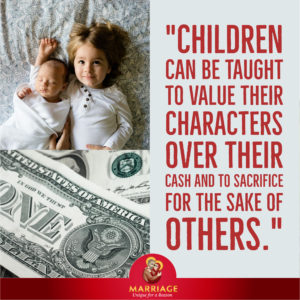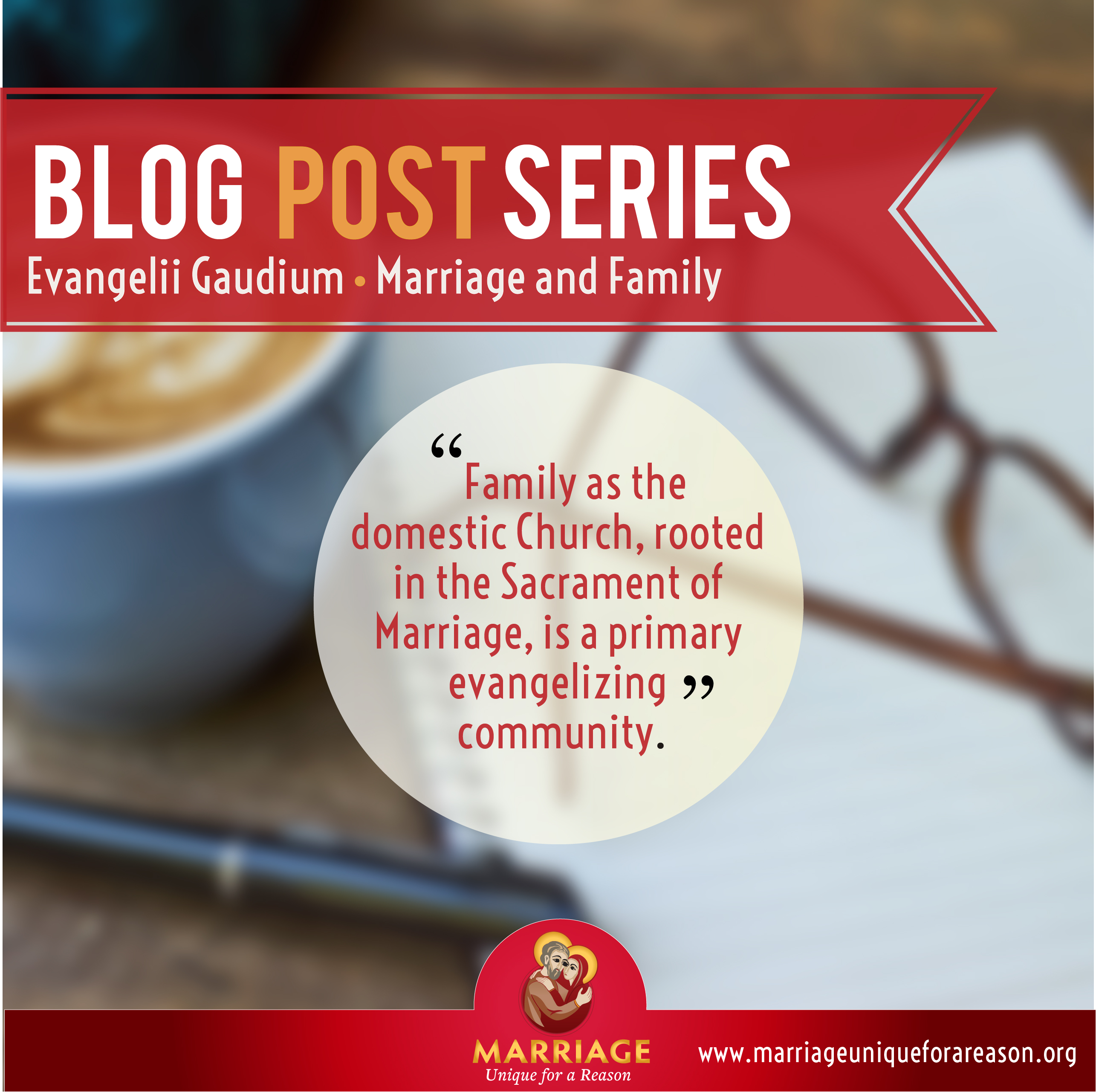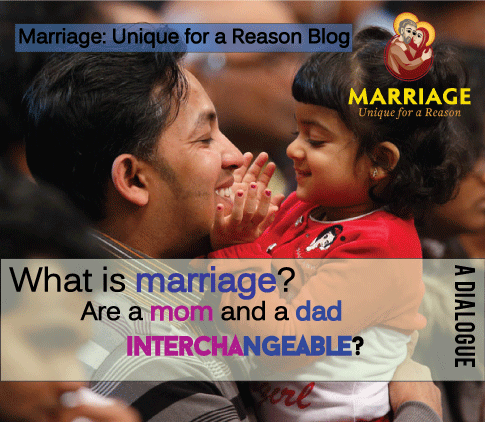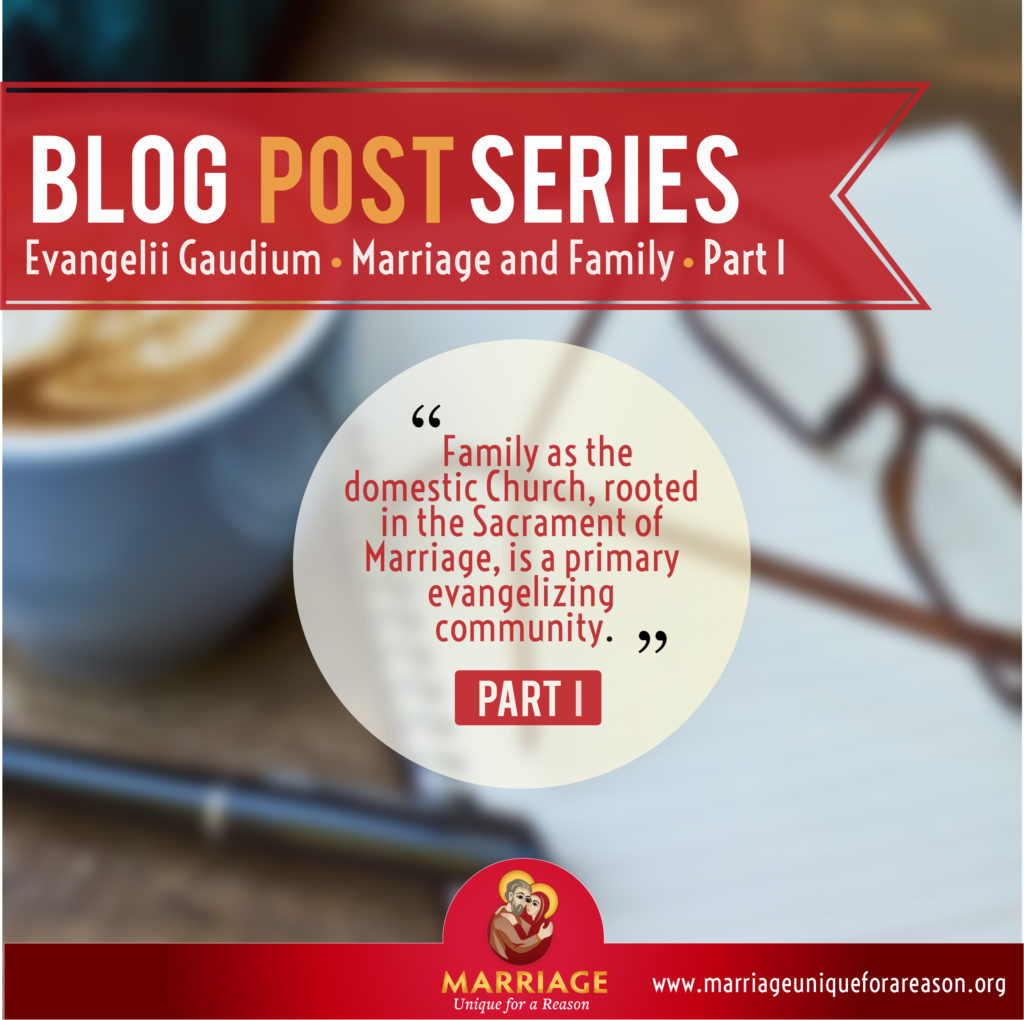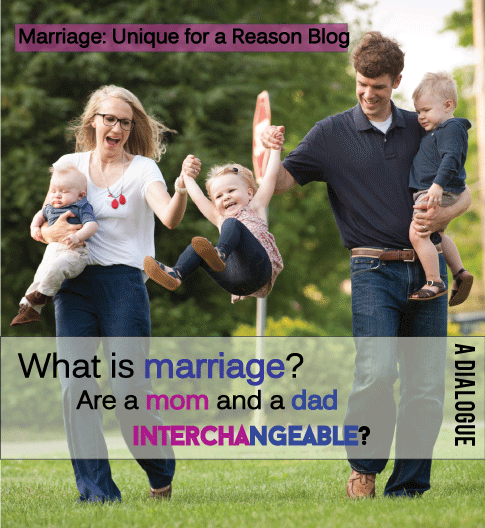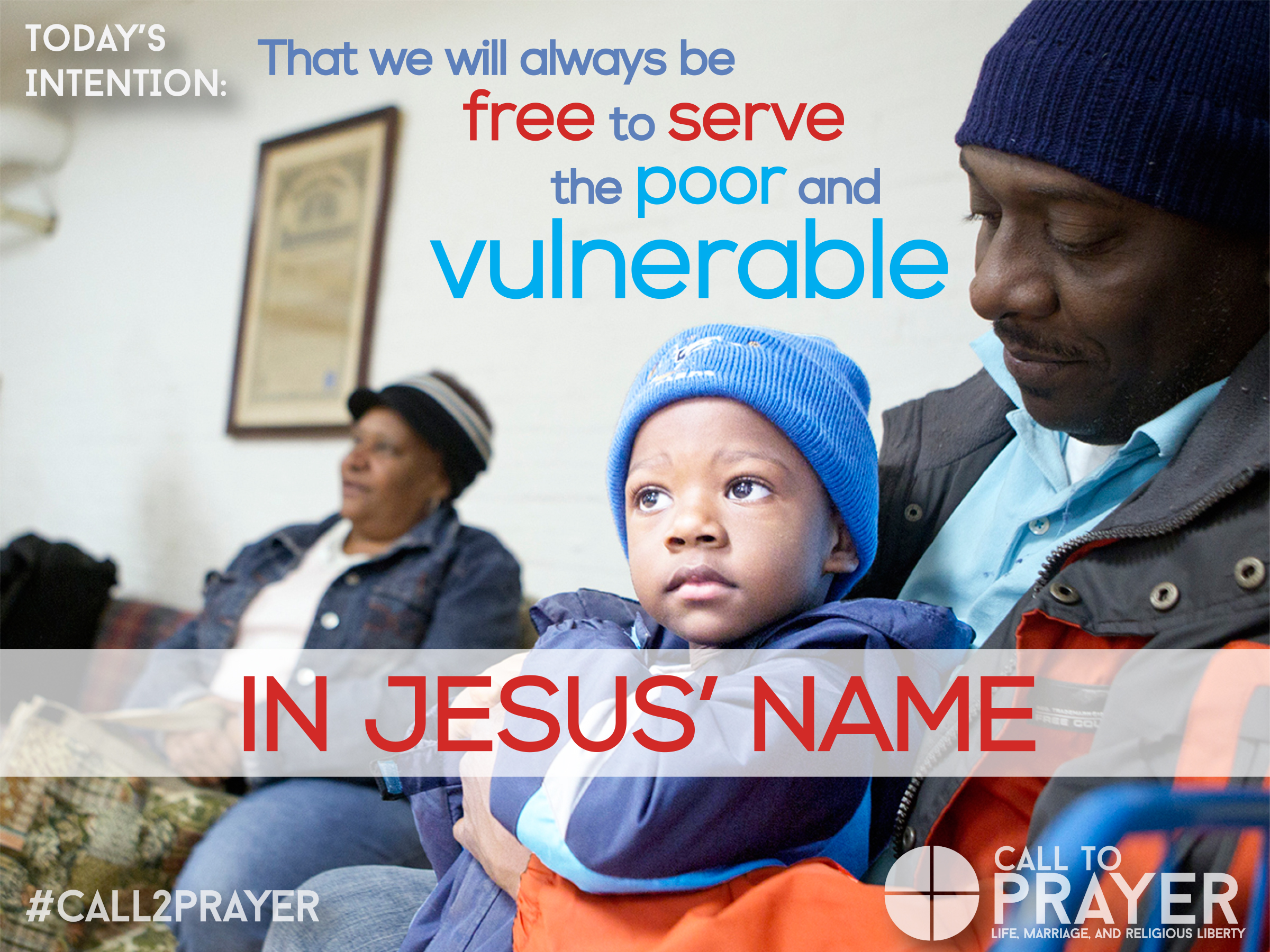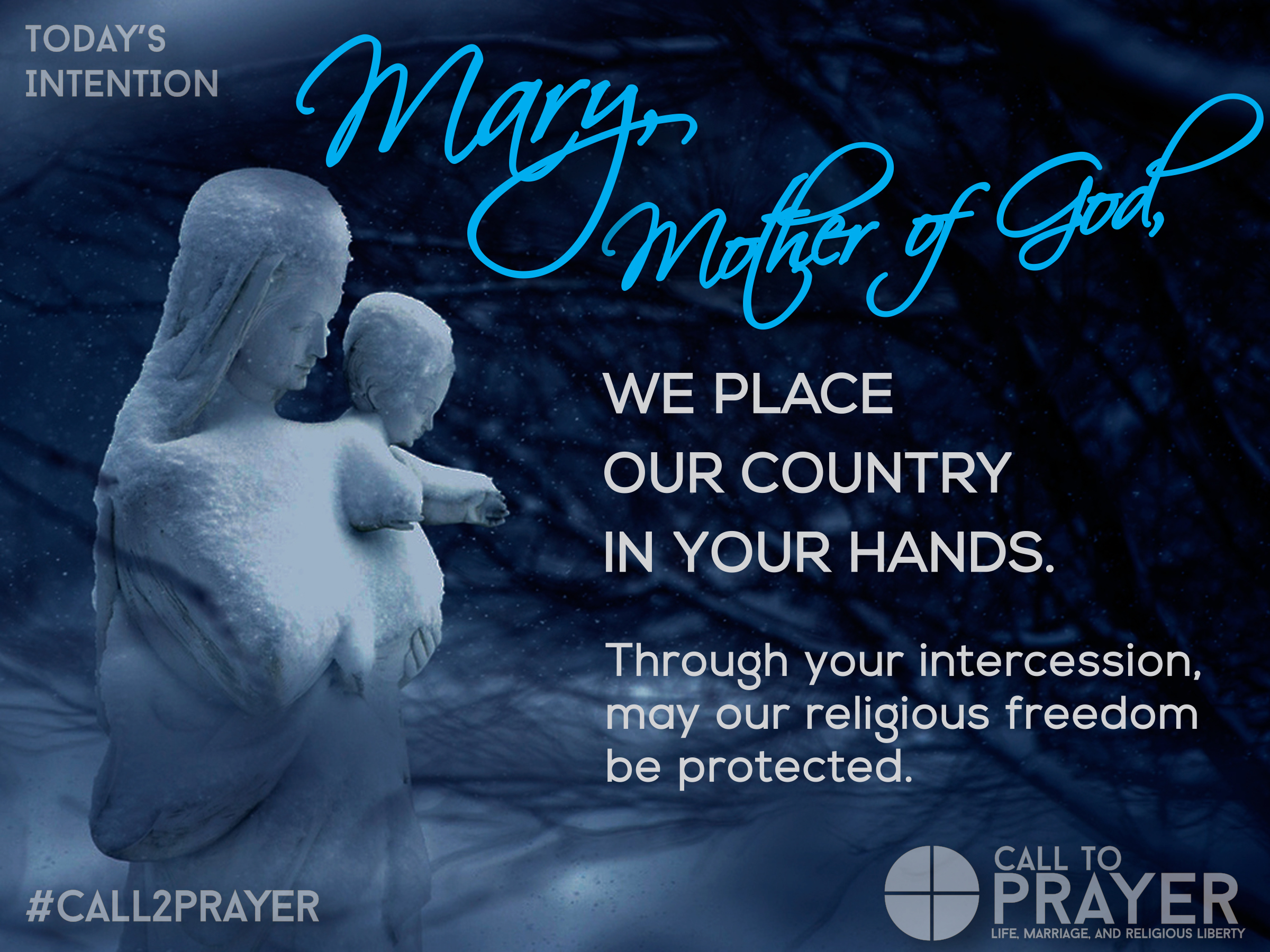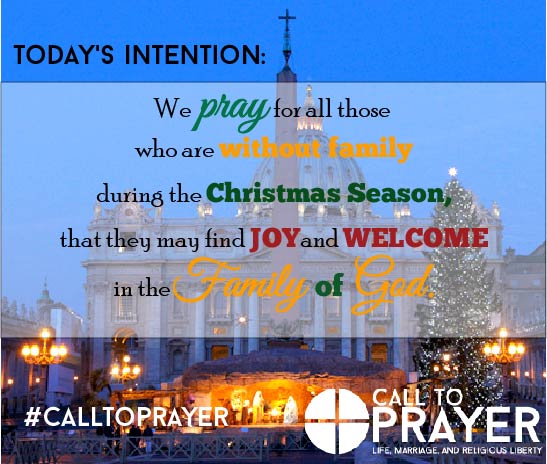A Dialogue on Marriage: Part Six
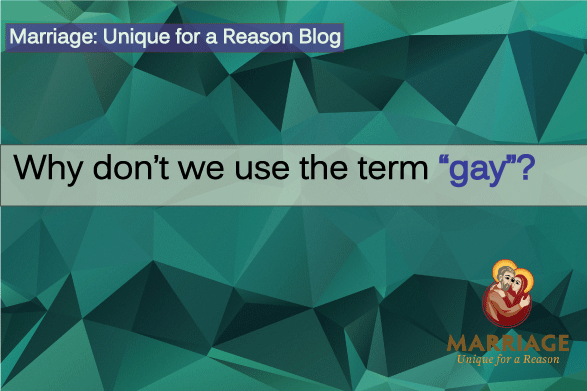 Today we finish our series in which we have eavesdropped on Socrates and a person of good will (Bob) discussing the question “What is Marriage”. Let us know if it was helpful!
Today we finish our series in which we have eavesdropped on Socrates and a person of good will (Bob) discussing the question “What is Marriage”. Let us know if it was helpful!
Socrates: Well Bob, I think you wanted to talk more about the distinction I made between use and respect.
Bob: Yes, I did. You made it sound as if people in a same-sex relationship don’t respect one another, and I totally disagree with that.
Socrates: I’m sorry if that’s what it sounded like. I didn’t mean that they disrespect one another in any sort of conscious way. What I meant is that, objectively speaking, what they are doing with their bodies sexually does not respect the way that their bodies are made or the full meaning of sex.
Bob: Why?
Socrates: Because the sexual expression of human beings is meant to unite the two ways of being human with one another, with the possibility of creating new life—all of course within marriage. A man’s body, in its sexual capacity, only makes sense when paired with a woman’s, and vice versa.
Bob: But don’t many men and women use and disrespect each other? I see people in same-sex relationships that seem to care for one another more than some opposite-sex relationships I know.
Socrates: That’s true. Unfortunately, many men and women disrespect each other, for example by having sex outside of marriage or by using each other in marriage. But we’re talking about the meaning of the human body and sex. This meaning can be respected or disrespected whether one is same-sex attracted or opposite-sex attracted.
Bob: Okay, fine. But people of the same sex can still be the best of friends even if they don’t express it sexually. Also, I know someone who is gay and lives with his partner, and their relationship teaches me a lot about love and acceptance of one another.
Socrates: Have you noticed that I don’t use the term “gay” to describe anyone?
Bob: I had noticed that, yeah, mostly because it makes this dialogue quite wordy. You keep saying “persons attracted to the same sex” or “persons with same-sex attraction.” Why?
Socrates: Well, should a person be defined by their sexual attraction? They are a man or a woman; that means they are objectively made in such a way that they can unite totally with a person of the opposite sex. That’s a fundamental fact; if they experience sexual attraction for someone of the same sex, acting on that isn’t ever going to lead to full union. Calling someone “gay” or a “lesbian” means that you are defining them by an attraction that is at cross-purposes with their identity as a man or a woman.
Bob: But if that’s how they define themselves, it’s silly, even disrespectful, of me not to.
Socrates: I disagree. I think that by refusing to define someone by their sexual attractions, you can remind them that they have lots of other qualities and that you don’t put them into one label.
Bob: Okay I can see what you mean. I’m going to have to think about this more because I haven’t thought that it’s that big of a deal. I get what you’re saying that sexual attraction is only part of the person, but at the same time, adults tend to structure their lives around sexual relationships.
Socrates:You’re right. But if you think that someone’s sexual relationship may be harmful to them, you don’t want to define them by it, right?
Bob: Right. But if they’re my friend, they’re my friend. Period. I will be there for them, no matter what, and they can tell me anything. They don’t have to hide with me.
Socrates: Okay. What if they want your approval of a sexual relationship that they’re in? What if they want society to approve of their relationship as a marriage?
Bob: I would just tell them that I love and care about them… but I’m not sure about the marriage thing.
Socrates: Why not?
Bob: I don’t know. I have to think about it.
Socrates: Okay. That’s an important question. Thanks for thinking about it, Bob. Look forward to our next opportunity to chat. Well I guess the only thing I’d want to say to you as we end is that I think people with same-sex attraction have a pretty important role to play these days.
Bob: Thanks, Socrates.
FAQ: Why does the Catholic Church care so much about marriage?
Archive
Evangelii Gaudium, Marriage and Family: Part Four
 Pope Francis’s Apostolic Exhortation on the proclamation of the Gospel in today’s world, Evangelii Gaudium or “The Joy of the Gospel,” has many points that are relevant to the work of Marriage: Unique for a Reason. This series will explore some of these themes and apply Pope Francis’s words to the culture of marriage and family in the United States.
Pope Francis’s Apostolic Exhortation on the proclamation of the Gospel in today’s world, Evangelii Gaudium or “The Joy of the Gospel,” has many points that are relevant to the work of Marriage: Unique for a Reason. This series will explore some of these themes and apply Pope Francis’s words to the culture of marriage and family in the United States.
Cultural Challenges
Why does it seem so hard to transmit the Gospel in today’s world? Pope Francis writes about the many challenges of modern culture: relativism, secularism, materialism, indifference. In particular, he writes about how people accept the Church in some ways (her service to the poor) while rejecting her in other ways (many of her teachings). “…[W]e find it difficult to make people see that when we raise other questions less palatable to public opinion, we are doing so out of fidelity to precisely the same convictions about human dignity and the common good” (no. 65). For example, the Gospel that sends us out to feed the poor is the very same Gospel that calls us to chastity.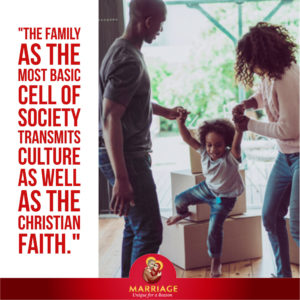
Pope Francis explicitly writes about the importance of the family here: “The family is experiencing a profound cultural crisis,” which is “particularly serious because the family is the fundamental cell of society, where we learn to live with others despite our differences and to belong to one another” (no. 66). He laments modern cultures’ loss of the true nature of love, instead reducing it to “mere emotional satisfaction” (no. 66).
The family as the most basic cell of society transmits culture as well as the Christian faith. Pope Francis points out that “an evangelized culture, for all its limits, has many more resources than the mere sum of total believers” because it “contains values of faith and solidarity” and “possesses a particular wisdom” (no. 68). Countries of a Catholic tradition already have, in a sense, more to work with, and thus simply need revitalization, reminding and purification. Countries of other religious backgrounds or those deeply secularized need people of faith to “spark” new processes of evangelization and help form new cultural movements (no. 69).
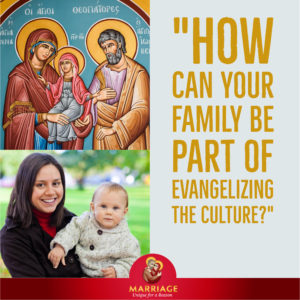 How can your family be part of evangelizing the culture? One example is a group of families who began organizing contra dance and ceili nights for their children and teens. In a culture where the normal idea of middle or high school dances is rap and techno, these families are teaching their children and adolescents dances that have form and set etiquette. Perhaps one day they will be in the position to ask for such a dance to be held at their local school, in place of another type. Please share your own ideas!
How can your family be part of evangelizing the culture? One example is a group of families who began organizing contra dance and ceili nights for their children and teens. In a culture where the normal idea of middle or high school dances is rap and techno, these families are teaching their children and adolescents dances that have form and set etiquette. Perhaps one day they will be in the position to ask for such a dance to be held at their local school, in place of another type. Please share your own ideas!
Thank you for reading the fourth post of our Evangelii Gaudium – Marriage and Family blog post series. We hope you enjoyed it. Please stay updated through our blog and social media sites for future blog post! Click on the image below to be directed to all published articles within the Evangelii Gaudium blog series.
Archive
A Dialogue on Marriage: Part Five
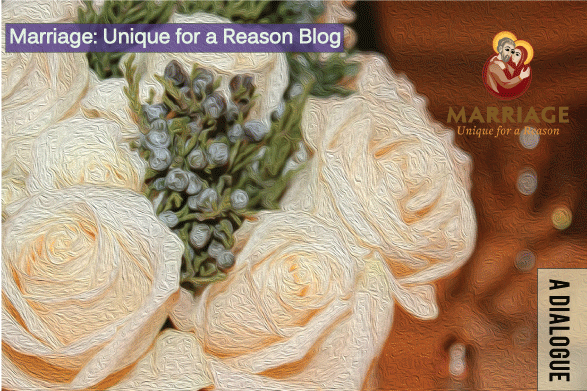 Part Five of the Six-Part series beginning with the question, “What is Marriage?”
Part Five of the Six-Part series beginning with the question, “What is Marriage?”
Socrates: Bob, I have a cute story to share with you, if I may.
Bob: Sure, go ahead.
Socrates: I was tucking my daughter into bed, and she got a dreamy look on her face as she said, “Daddy, I want to marry you.” I smiled and told her that she couldn’t marry me, but that someday she might want to marry someone else. She looked very sad, and said, “But I love you so much!” I told her that she would always love her daddy, but that love isn’t the same kind of love as married love.
Bob: I think I know where you’re going with this.
Socrates: Well what do you think about that? Should a daughter be able to marry her dad, since she loves him?
Bob: Of course not!
Socrates: But why not?
Bob: Because, like you said, it’s a different kind of love—or at least it should be.
Socrates: Do you think it is true love though?
Bob: Of course.
Socrates: Then we agree that there are several ways of truly loving people, not all of which lead to marriage.
Bob: Naturally. But I think that the love that two men or two women have for each other can be the kind that leads to marriage.
Socrates: Even though, when we talked previously, you admitted that they can’t unite completely, the way that a married man and woman can?
Bob: They can unite on a deeply personal level though, and be companions for one another throughout life . Maybe it shouldn’t be called marriage, but it’s something.
Socrates: What would you call it?
Bob: Some laws call it a civil union— that they are close friends who support one another and love each other, and implied in that love is a sexual relationship.
Socrates: Do you think that the sexual relationship is an integral or essential part of a same sex friendship then?
Bob:Not in general, but for people who are attracted to the same sex, it is: yes!
Socrates: Then you would say that the body itself is neutral in terms of sexual expression?
Bob: What do you mean?
Socrates: It seems you’re saying that the body, the way it’s made, doesn’t reveal how one’s sexuality is meant to be expressed.
Bob: You mean that the attraction and the body are entirely different things, so that a man can be attracted to either a man or a woman and it’s basically the same thing?
Socrates: Right. Is that what you think?
Bob: Yes. Clearly some people are attracted to others of the same sex. You wouldn’t deny that, would you?
Socrates: No, I wouldn’t, but I would question the idea that just because it happens, it’s the same as when someone is attracted to people of the opposite sex.
Bob:Sexual attraction is just that, attraction… being drawn to someone, feeling connected to them. It’s not everything about a person, but it is pretty determinative of a person’s life: who they love.
Socrates: Okay, but what is the “end” of sexual attraction?
Bob: What do you mean, “end”?
Socrates: I mean purpose. What is the purpose of sexual attraction?
Bob:The continuation of the species… and the making of a community and family.
Socrates: How does sexual attraction to a person of the same sex continue the species?
Bob: It doesn’t; but it can make two people into a community.
Socrates: How?
Bob: Like I already said, they can share a life together.
Socrates: Okay, but I can’t see any reason why being “a community” requires a sexual relationship. In fact, I think a sexual relationship in which the most obvious purposes of sex (total union and procreation) are not respected does more harm than good. That’s usually the case when something is used in the wrong way, and not treated with the dignity or respect it deserves.
Bob: We’re going to have to come back to this.
FAQs: Isn’t marriage a private relationship? What does it have to do with the common good?
What about “civil unions” or “domestic partnerships”?
Archive
Evangelii Gaudium, Marriage and Family: Part Three
 Pope Francis’s Apostolic Exhortation on the proclamation of the Gospel in today’s world, Evangelii Gaudium or “The Joy of the Gospel,” has many points that are relevant to the work of Marriage: Unique for a Reason. This series will explore some of these themes and apply Pope Francis’s words to the culture of marriage and family in the United States.
Pope Francis’s Apostolic Exhortation on the proclamation of the Gospel in today’s world, Evangelii Gaudium or “The Joy of the Gospel,” has many points that are relevant to the work of Marriage: Unique for a Reason. This series will explore some of these themes and apply Pope Francis’s words to the culture of marriage and family in the United States.
The Gospel and Finances
In chapter two of Evangelii Gaudium, the Holy Father comments on the crisis of communal commitment by going through a series of “No’s”: “No to an Economy of Exclusion,” “No to the New Idolatry of Money,” “No to a Financial System Which Rules Rather than Serves,” and finally, “No to the Inequality which Spawns Violence” (nos. 53-60).
 All of these statements about money and its place in our lives have implications for marriage and the family. First, on the “economy of exclusion,” Pope Francis writes that by excluding certain persons or groups from access to social and economic opportunities, “we have created a ‘disposable’ culture which is now spreading” (no. 53). The first step in combatting a “disposable” culture must be to acknowledge that from the beginning to the end of life, each human being is precious and irreplaceable. The proper context for this is the family, where the child is first welcomed, and where, on the other end of earthly life, the elderly may be cared for.
All of these statements about money and its place in our lives have implications for marriage and the family. First, on the “economy of exclusion,” Pope Francis writes that by excluding certain persons or groups from access to social and economic opportunities, “we have created a ‘disposable’ culture which is now spreading” (no. 53). The first step in combatting a “disposable” culture must be to acknowledge that from the beginning to the end of life, each human being is precious and irreplaceable. The proper context for this is the family, where the child is first welcomed, and where, on the other end of earthly life, the elderly may be cared for.
Pope Francis notes that in the modern world “we have created new idols… man is reduced to one of his needs alone: consumption” (no. 55). The gap between the rich and the poor keeps widening and the “deified market” becomes “the only rule” (no. 56). The family can counter this trend by remaining as a place where human beings are clearly valued above financial gain or consumption.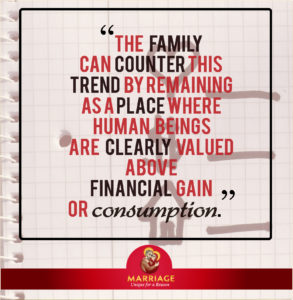
A family who chooses and is able to receive the blessing of a large number of children, for example, gives up material comforts for the sake of human beings. Children can be taught to value their characters over their cash and to sacrifice for the sake of others.
“The Pope loves everyone, rich and poor alike, but he is obliged in the name of Christ to remind all that the rich must help, respect and promote the poor” (no. 58). Families are called to foster generosity in their children: awareness of the privileges they have and the obligations such privileges entail. Parents must model respect for the poor and solicitude for those in need.
Parents are also called to educate their children about the larger systems that affect family life, and to help them develop compassion for the poor around the world in concrete ways. In many places evil is “embedded in the structures of society” (no. 59). Families cannot ignore the larger societal trends and policies that keep the poor poor and the rich rich. They must not be complacent about the desire for justice. Pope Francis’s words on the “economy of exclusion” have implications for every family
Thank you for reading the third post of our Evangelii Gaudium – Marriage and Family blog post series. We hope you enjoyed it. Please stay updated through our blog and social media sites for future blog post! Click on the image below to be directed to all published articles within the Evangelii Gaudium blog series.
Archive
A Dialogue on Marriage: Part Four
 Continuing the series on marriage with Bob and Socrates. Check out parts one to three first!
Continuing the series on marriage with Bob and Socrates. Check out parts one to three first!
Bob: I think I understand now your objections to same-sex couples being considered the same as married couples: it’s about children and what’s good for them.
Socrates: That’s true, but it’s not all. It’s also about doing justice for everyone, even those who are attracted to persons of the same sex, since they were also made to love as God does.
Bob: Except that’s what you’re denying them: the right to love.
Socrates: Who said that?
Bob: You did. You said they can’t get married because that’s not what marriage is.
Socrates: Is marriage the only form of love?
Bob: No, but it is the ultimate form. Even according to the Bible!
Socrates:You mean because marriage is a symbol of Christ’s union with the Church?
Bob: Yes. Basically, you’re denying people the ultimate way to express their love for each other.
Socrates: How did Christ express His union with the Church?
Bob: By marrying her, like I said.
Socrates: And when did He marry her?
Bob: I don’t know. Didn’t Jesus go to a wedding at some point?
Socrates: Yes, He did, but it wasn’t His own. I’ll give you a hint: Jesus showed His love by dying for the Church.
Bob: Oh. On the cross.
Socrates: (silence)
Bob: What?
Socrates: Well it doesn’t sound like Christ’s idea of love or marriage is about an emotional attachment to another adult, does it? It sounds more like Christ’s love was expressed by self-sacrifice; by offering Himself to do the Father’s will, even when that was obedience unto death.
Bob: What are you saying?
Socrates: I’m saying that we are all called to imitate Christ before anything else. Every one of us is called to sacrificial love. For some people, that means the total gift of self in marriage, which always entails sacrifices. For others, loving as Christ does may mean celibacy for the Kingdom of God.
Bob: But telling someone they have to be celibate for life seems so harsh.
Socrates: Only if you equate love with sex and don’t acknowledge other ways of finding love and fulfillment. There’s also a distinction between telling someone they have to do something and someone’s freely choosing and accepting to be celibate.
Bob: Sounds like we might need to talk about this more.
FAQ: Isn’t it unjust discrimination to not allow two men (or two women) to marry?
Archive
A Dialogue on Marriage: Part Three
 This is Part Three of a Six-Part series on the question, “What is Marriage?” Please check out parts one and two before this!
This is Part Three of a Six-Part series on the question, “What is Marriage?” Please check out parts one and two before this!
Socrates: So Bob, have you had a chance to think about what we talked about last time?
Bob: Yes, I have, and I realized that you are missing a really important fact.
Socrates: I am?
Bob: Yes. You are presenting the ideal. I’m talking about what’s real. There are a lot of children who, for lots of reasons, can’t be raised by their biological mother and father.
Socrates: I know that.
Bob: Well if that’s true, then it means that we have to accept the reality of the situation and try to do something good for the child, even if it is not ideal.
Socrates: You’re right. What are you proposing?
Bob: One of the ways we can help children is by allowing a same-sex couple to adopt them, thus creating a family.
Socrates: That’s a bit of a leap, isn’t it?
Bob: What do you mean?
Socrates: I mean that you looked compassionately at a tragic situation that many children find themselves in, and then jumped to a “solution” that doesn’t actually meet the need that they are experiencing.
Bob: I’m sorry; I still don’t quite follow you.
Socrates: Let’s say that a child is born to a mother and a father, who are both subsequently killed in a car accident. There is no other family, and the child is placed under the care of the state. That seems like the worst thing that can happen to the child, right?
Bob: Right. Even losing just one parent is terribly traumatic for a child.
Socrates: Exactly. So what has the child lost, when his or her parent dies?
Bob: The child has lost the real-life connection to and support of his or her mother and father; a relationship that should have guided the child into adulthood.
Socrates: Right. Like we talked about last time, a child would miss not just the functions that a mom and dad serve; he or she would miss the relationship to a person of each sex who relate to the child in a unique way, as well as the chance to observe the mom and dad relating to each other.
Bob: Yes, that’s right.
Socrates: Can you see how your solution—allowing two persons of the same sex to adopt—does not solve this problem?
Bob: You mean because the child will still be missing either a mom or a dad?
Socrates: Precisely.
Bob: I guess you’re right, but the child is still missing his or her own mom and dad, no matter what adoptive situation comes up. I don’t think it’s that big of a difference to the child whether he or she is adopted by a man and a woman or two people of the same sex, as long as the child is loved.
Socrates: It is true that an adopted child usually loses a real-life connection to their biological parents (at least most of the time) and that’s sad, no matter what happens next.
Bob: Adoption is always a response to a non-ideal situation—to a need or a deprivation experienced. Is that what you mean?
Socrates: Yes. But when the child is adopted by a married mother and father, he or she will still be given a concrete and living relationship with both a mom and a dad. They will still experience those different relationships and be able to observe the relationship between the parents as a model.
Bob: But there are plenty of children who are adopted or being raised by single parents who do just fine .
Socrates: The question of single parenthood is an interesting one and actually distinct from the question of adoption by two persons of the same sex. Perhaps we can take it up again at another time.
FAQ: Why is a child meant to have both a father and a mother?
Archive
Evangelii Gaudium, Marriage and Family: Part Two
 Pope Francis’s Apostolic Exhortation on the proclamation of the Gospel in today’s world, Evangelii Gaudium or “The Joy of the Gospel,” has many points that are relevant to the work of Marriage: Unique for a Reason. This series will explore some of these themes and apply Pope Francis’s words to the culture of marriage and family in the United States.
Pope Francis’s Apostolic Exhortation on the proclamation of the Gospel in today’s world, Evangelii Gaudium or “The Joy of the Gospel,” has many points that are relevant to the work of Marriage: Unique for a Reason. This series will explore some of these themes and apply Pope Francis’s words to the culture of marriage and family in the United States.
From the Heart of the Gospel
Pope Francis writes in this section about how the deep and beautiful truths of the Gospel are often not communicated effectively in the modern world because of the focus of mass communications on the controversial or difficult moral teachings. He calls the pastoral ministers of the Church to concentrate instead on, “the essentials, on what is most beautiful, most grand, most appealing and at the same time most necessary” (no. 35).
 Christian Marriage, which takes into account the basic human desire to love and be loved, to give life and receive it, is certainly one of the most beautiful and appealing aspects of the Gospel. Marriage is essentially a response to a love that precedes it— God’s love. “For God so loved the world…” (John 3:16) that Christian spouses are able to love one another with His own love.
Christian Marriage, which takes into account the basic human desire to love and be loved, to give life and receive it, is certainly one of the most beautiful and appealing aspects of the Gospel. Marriage is essentially a response to a love that precedes it— God’s love. “For God so loved the world…” (John 3:16) that Christian spouses are able to love one another with His own love.
The Gospel transforms daily life; it enlivens our hearts with hope and trust in God. We experience the Holy Spirit through joy and peace, generosity and service. God is visible in gatherings of families—children running around playing while the adults converse, for example, and in religious communities—working together with smiles and unruffled patience. These are witnesses to the faith that are “most appealing and at the same time most necessary.”
Why most necessary? Because there is fear in the modern heart. Getting married and raising a family based on Christ’s love has always been a daunting though enriching task embraced by many young people, but today many young people are delaying marriage or even not getting married at all. The most recent Pew research study, for example, showed that a record number of young adults in America are unmarried and that many young people do not see marriage as a priority. Cohabitation has increased, more children are born out of wedlock, and divorce is fairly common. 
In these circumstances, the Gospel of the Family in the context of “the harmonious totality of the Christian message” (no. 39) is ever more necessary. Men and women need to hear and see that God can do even what seems impossible: bond two flawed human beings together for life, in love and fidelity. This is “the fragrance of the Gospel” (no. 39). Married couples, young and old, share your love visibly and inspire young people with your witness of fidelity!
Thank you for reading the second post of our Evangelii Gaudium – Marriage and Family blog post series. We hope you enjoyed it. Please stay updated through our blog and social media sites for future blog post! Click on the image below to be directed to all published articles within the Evangelii Gaudium blog series.
Archive
A Dialogue on Marriage: Part Two
Today we continue to eavesdrop on a conversation about marriage, begun on Monday.
Socrates: So Bob, when last we spoke, we were talking about whether it’s important for children to be raised by both a mother and a father.
Bob: Yes, that’s right. And I pointed out that parenting skills are not the issue when it comes to what children need; obviously two men or two women can have great parenting skills.
Socrates:That’s true, I think. Would you say that fathering and mothering is primarily about certain qualities or skills, or rather about a relationship?
Bob: What do you mean?
Socrates: A mom and a dad can both change a diaper equally well, for example—that’s a skill, and, come to think of it, a babysitter can do that just as well as a parent. But if fathering and mothering are about a relationship, then it’s not so much that a father does different things than a mother does, but rather that moms and dads do similar or even identical things differently.
Bob: Oh, okay. I would say the relationship then, if you put it that way. A father relates to his child in a different way than a mother does, and vice versa—even if they share certain skills.
Socrates: Do you think that’s a good thing?
Bob: Yes, I do.
Socrates: So you would agree, then, that speaking about fathers and mothers always implies unique relationships within the family: father to mother, father to child, mother to child, father to mother to child?
Bob: That makes sense, but I don’t understand how this relates to the question about marriage.
Socrates: You agree that the father-child relationship and the mother-child relationship are different, right?
Bob: Yes.
Socrates: And that having both a mother and a father is the best thing for a child?
Bob: Sure, I would say that.
Socrates: Okay, then I would just point out that your definition of marriage doesn’t show that.
Bob: You mean that if marriage is, as I said, about “two adults in a sexual relationship who commit to live together and have a family together,” then the father-mother-child relationship doesn’t necessarily figure into the discussion, because the emphasis is on adults?
Socrates:That does seem to follow. But if marriage is and can only be a union of a man and a woman, and the child comes from that union, then the father-mother-child relationship would be really important to the discussion.
Bob: Are you saying that when people talk about marriage today, they may be talking about a different thing?
Socrates: Yes, you can put it that way. The meaning of marriage matters, and many times that meaning is presumed but not examined.
Bob: How so?
Socrates: If marriage is the permanent, faithful, and fruitful union of a man and a woman, it is the only reality that truly unites for life a man and a woman and any children conceived of their union as a family. If, on the other hand, marriage is simply about adults and about validating their own commitments, attachments, and desires—however well intended they may be—this is a different understanding.
Bob: But don’t most people agree that marriage is mostly about adults loving each other?
Socrates: That’s not clear, since many people are not asking the right question; they ask why certain couples can’t get married instead of asking what marriage is. We all should be concerned about asking the right question and arriving at the correct answer. Because, as you agreed, every child has a mother and a father, it would seem to follow that promoting the correct understanding of marriage, not censoring it, is really important for children and for all of us.
Bob: Interesting. I’ll get back to you.
—
FAQ: What is Marriage?
Archive
Evangelii Gaudium, Marriage and Family
Pope Francis’s Apostolic Exhortation on the proclamation of the Gospel in today’s world, Evangelii Gaudium or “The Joy of the Gospel,” has many points that are relevant to the work of Marriage: Unique for a Reason. This series will explore some of these themes and apply Pope Francis’s words to the culture of marriage and family in the United States.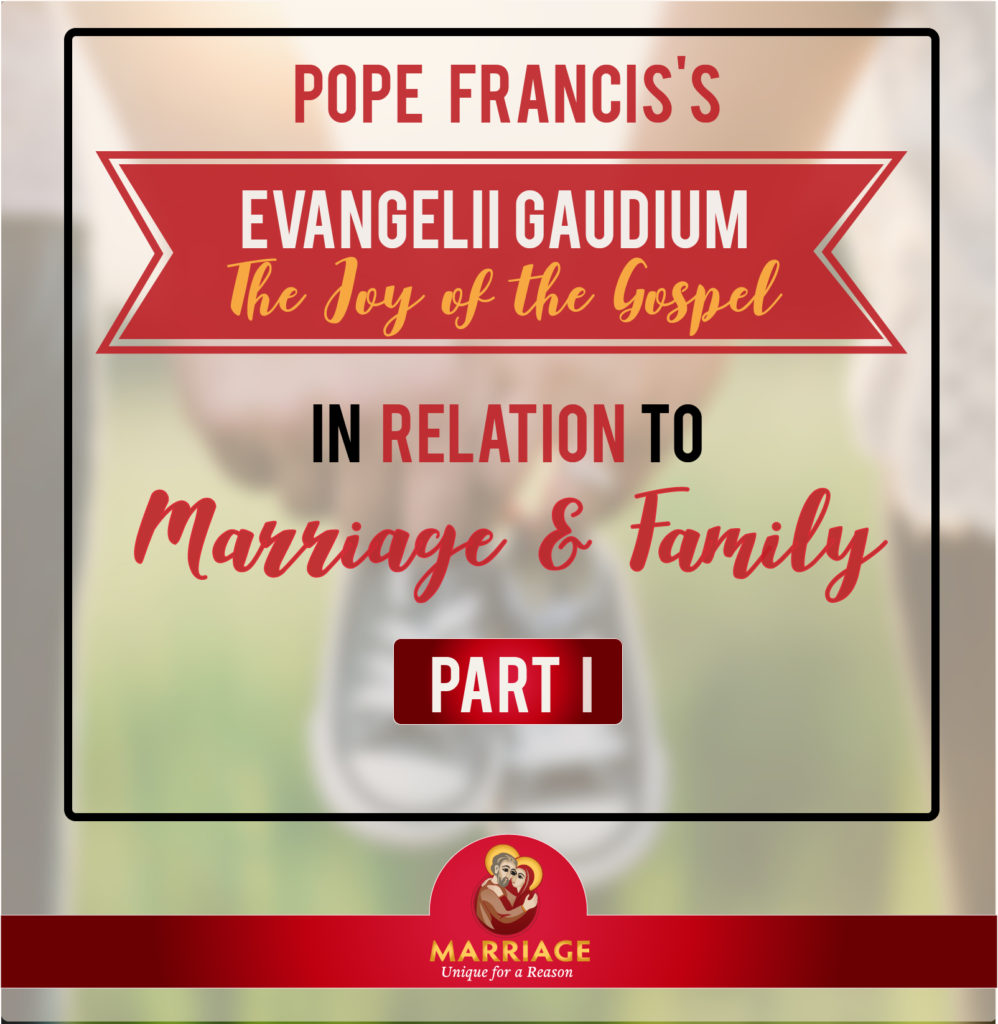
A Church Which Goes Forth
God calls His people to go forth, to proclaim the Gospel to all the ends of the earth. We do not go as slaves in drudgery, but as Jesus’ friends in joy and peace. “The Gospel joy which enlivens the community of disciples is a missionary joy” (no. 21). A soul set free by Christ is enlivened by the Holy Spirit to proclaim His message; we see this all over the Gospels, from the Samaritan woman at the well (John 4) to the man born blind (John 9).
In one of his homilies, the Holy Father noted, “The great Paul VI said that you cannot advance the Gospel with sad, hopeless, discouraged Christians. You cannot… Often Christians behave as if they were going to a funeral procession rather than to praise God, no? And this joy comes from praise…” We are called to be people of praise, and thus of joy. Our joy should be catching.
Pope Francis continues, “An evangelizing community gets involved in word and deed in people’s daily lives; it bridges distances, it is willing to abase itself if necessary, and it embraces human life, touching the suffering flesh of Christ in others” (no. 24). Where is this seen the most? In the family.
Family as the domestic Church, rooted in the Sacrament of Marriage, is a primary evangelizing community. In this two-become-one-flesh relationship, each of the spouses in a sense evangelizes the other, but as a communion, the two together evangelize their family. Think first of the way that moms and dads love their children. Is there any better example of an evangelizing community?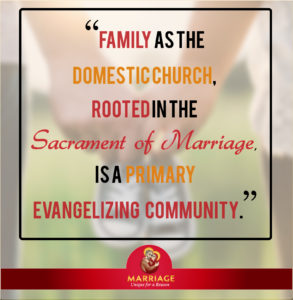
1. It bridges distances: The distance between generations is bridged by the love of parents for their children, and for their children’s children, and so forth. Wisdom is passed on, guidance offered.
2. It is willing to abase itself: Any parent could offer numerous stories of times where they have humbly submitted to their lack of control over their child’s behavior. Parents who refuse to take credit for their children’s good behavior, talents or abilities, but instead are content to allow their child to shine.
3. It embraces human life: Children are lovingly welcomed into the family by a mother and a father. Whether through conception, adoption, foster care, or even simple hospitality, the home of a husband and wife is open to others.
4. It touches the suffering flesh of Christ in others: Before any other experience of human care and compassion, the infant receives all he or she needs from mother and father. From the first cold to broken bones, to even mental illness or addiction, parents are the first responders to the suffering of their children.
And as for taking on “the smell of the sheep” (no. 24) … need any more be said?
Thank you for reading the first post of our Evangelii Gaudium – Marriage and Family blog post series. We hope you enjoyed it. Please stay updated through our blog and social media sites for future blog post! Click on the image below to be directed to all published articles within the Evangelii Gaudium blog series.
Archive
SCOTUS Accepts Case, Archbishop Responds
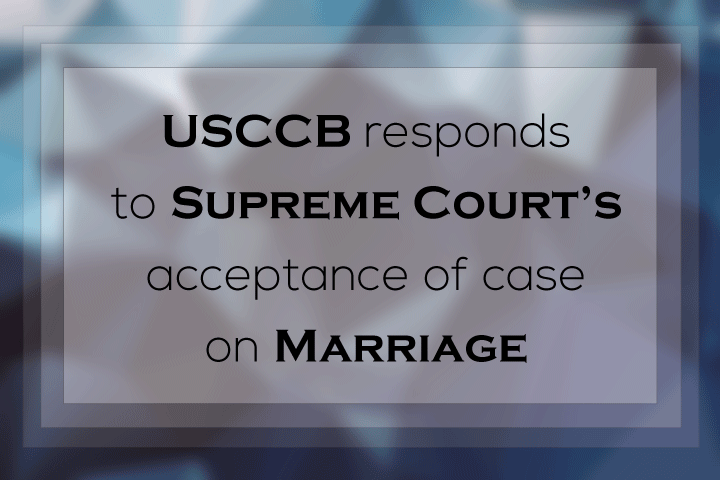 Archbishop Cordileone of San Francisco responded to the announcement on Friday that the Supreme Court will hear the Sixth Circuit marriage cases.
Archbishop Cordileone of San Francisco responded to the announcement on Friday that the Supreme Court will hear the Sixth Circuit marriage cases.
The Archbishop notes, “Only a man and a woman can unite their bodies in a way that creates a new human being. Marriage is thus a unique and beautiful reality which a society respects to its benefit or ignores to its peril.”
Archive
A Dialogue on Marriage: Part One
All of the talk about marriage hinges on this question; often, when we ask it simply and directly, the answer is halting, hesitant, and surprising. When we ask a question like this, we should try to approach it with genuine curiosity and a willingness to try to figure out the truth. Socrates, for one, was always asking questions in order to help others come to understanding. So let’s try approaching marriage with this form of philosophical questioning in mind.
Socrates: What is marriage?
Bob: It’s when you love someone and commit to live together and have a family.
Socrates: A man loves his mother, lives with her and is family with her: is that a marriage?Bob: No, no—marriage is when you love someone you’re not related to, and then you choose to become related.
Socrates: Like adopting a child?
Bob: No, not like adoption. The person you love is another adult.
Socrates: What do you mean by love?
Bob: A close, intimate relationship whereby you desire to unite with the other person completely; you share a home with that person; you want to have a family together.
Socrates: Oh, then you must mean a man and a woman.
Bob: No, I didn’t say that. A man and a man could do the same thing.
Socrates: How?
Bob: Two men or two women could love each other just like a man and a woman can. They can care for the other person before themselves, share deep communication, and adopt children together.
Socrates: Oh I thought you said that they unite “completely” and that they have a family “together.”
Bob: I did.
Socrates: But two men or two women cannot physically unite completely; it is impossible. Likewise, they cannot have children because they do not have the capacity.
Bob: Don’t be so crass. The two people can express their love sexually, that’s all I meant.
Socrates: But that’s not what you said. You said that married people unite completely. Now you’re saying that they only unite mostly—financially, socially. In which case, I’m not sure why that relationship should be considered special compared to other relationships. You can unite that way with many people; there’s no reason for friendship to be exclusive. Also, what about two sisters living together and taking care of a younger sibling with special needs? Are they married?
Bob: No, the point is that there are two adults in a sexual relationship who commit to live together and have a family together.
Socrates: Oh, so what’s crucial for marriage, you say, is that the two people are in a sexual relationship of some committed kind, though not a kind that necessarily brings about a union of their bodies. How do they have a family, by the way?
Bob: Often, one of the two people has children from another relationship.
Socrates: From a relationship with someone from the other sex…
Bob: Yes. Or the couple can adopt. Or they can go through the process of third-party reproduction.
Socrates: In which case, the child would not have a parent of one sex or the other.
Bob: All a child needs is two people who love them. It doesn’t matter what sex they are.
Socrates: But you would agree that every child has a biological mother and father, correct?Bob: Yes, I agree with that. That’s a simple fact.
Socrates: Are a father and a mother exactly the same? Are they interchangeable?Bob: Well…no, not exactly. They do seem to interact with children differently and there is more research out there now (http://www.paulraeburn.com/books/do-fathers-matter/) showing how important fathers are to the development of children.
Socrates: (Silence)
Bob: Okay, I will think about this more. But I don’t think parenting qualities or skills is the issue. Let’s talk about that next time.
Archive
Call to Prayer: January 16, 2015
Archive
World Meeting of Families Catechesis Series: Chapter Three
World Meeting of Families Catechesis Series
The USCCB is excited about the World Meeting of Families (WMF) being held in Philadelphia in September 2015. We are presenting a series of short articles focused on the WMF Catechesis Love is our Mission: The Family Fully Alive and its implications for our daily lives. We will follow the timing suggested by the Archdiocese of Philadelphia by exploring one theme each month leading up to the World Meeting. The Archdiocese for Military Services is also writing monthly reflections. Chapter Three is a click away.
Chapter Three: The Meaning of Human Sexuality
Sara Perla, Secretariat of Laity, Marriage, Family Life and Youth
As we continue to prepare for the World Meeting of Families, this month we reflect on the meaning of human sexuality, covered in chapter three of the catechesis. This chapter focuses on the meaning of the physical world for spiritual persons. Our bodies, in particular, speak of the human being’s call to love. As noted in paragraph 43, referencing the Letter on the Collaboration of Men and Woman, sexual difference reveals the spousal call of the human person and is not merely functional for the continuation the species. The catechesis goes on to remind us that “man and woman are willed for each other” (no. 44) and that “we are never self-sufficient” (no. 45). There are two concrete ways of living out the call to love as a vocation: marriage and celibacy for the Kingdom of God.
At the end of college, I was privileged to see the complementarity of these two states in a visible way. My friend Erika got engaged her junior year. For most of us, it was the first engagement of a friend, and at the bridal shower we giggled as we played shower games for the first time and ate finger food. A few of the women at the shower were among a (strikingly high) number from that graduating class who entered religious life. Natalie and Terri, two of that number, told us about the different parts of religious habits that they would embrace while we were discussing Erika’s wedding dress and their hopes for children.
I wondered if the wedding would make Natalie or Terri sad, since they would never have one, and all little girls dream about their weddings. While there may have been pangs that were hidden from view, they both seemed to enjoy every minute of the wedding weekend. They sang and danced, gathered flowers, prayed with Erika, and were generally just “normal” bridesmaids. After celebrating Erika and Todd and watching the happy couple drive away, the rest of the crowd gathered for a final party.
When I look around at that scene in my memory, I am overwhelmed by God’s goodness. Natalie and Terri have become vowed religious in two different communities, and two of the young men became priests. Three other women at that party entered religious life, but discerned they were not called to it after a few years. Many of the group married and have children. It has been over ten years now since that party, and there are no divorces, no broken vows. In an unusual way, my friends that summer gave me concrete examples of being willing to give your life completely back to Christ in marriage or in celibacy for the Kingdom, for life.
Archive
Florida Bishops Respond to Marriage Redefinition
Marriage licenses were issue for the first time today in Florida, after the expiration of a stay from the U.S. District Court ruling. The bishops of Florida wrote a statement in response.
The bishops note, “How society understands marriage has great public significance” and that redefining marriage, “advances the notion that marriage is only about the affective gratification of consenting adults. Such a redefinition of marriage does nothing to safeguard a child’s right to a mother and father and to be raised in a stable family where his or her development and well-being is served to the greatest extent possible.”
The bishops also note the wide range of laws that are affected by the change in definition. “These laws also affect and pervasively regulate public and private institutions including religious institutions, such as churches, schools, and hospitals. Besides the predictably disruptive effects, imposing this redefinition of marriage threatens both religious liberty and the freedom of individuals to conscientiously object as already seen in those states that have redefined marriage to accommodate same sex couples.”

